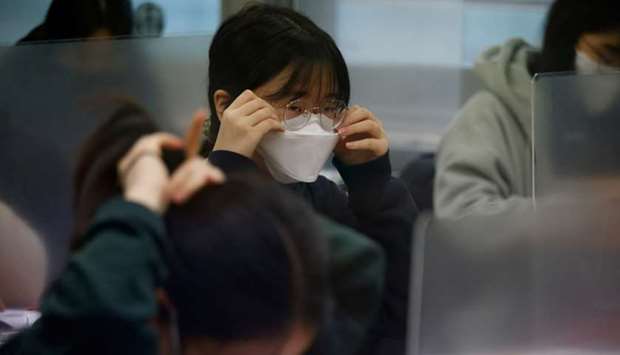* New infections at nine-month high
* Officials call outbreak most serious yet* Stricter social distancing measures to be enforced
* President apologises for burden of virus restrictions
South Korean President Moon Jae-in called on Monday for expanded coronavirus testing and more thorough tracing as the country struggled to control its latest and largest wave of infections.
The Korea Disease Control and Prevention Agency reported 615 new coronavirus cases as of midnight Sunday, capping a month of triple-digit daily increases that have led to 8,311 confirmed patients in quarantine, the most ever.
The surge in cases has deliverd a blow to South Korea's vaunted pandemic-fighting system, which successfully used invasive tracing, testing, and quarantines to avoid lockdowns, blunt previous waves, and keep infections below 50 per day for much of the summer.
Moon ordered the government to mobilize every available resource to track infections, and to expand testing by deploying the military and more people from the public service, presidential Blue House spokesman Chung Man-ho told a briefing.
Moon said testing sites should operate longer hours to allow people working to get tested at their convenience and more drive-through testing facilities should be set up, Chung said.
The positive rate for the latest batch of tests was about 4.2%, compared to the year's average of 1.2%, according to the KDCA.
Starting next week, testing centres will begin using a test kit designed to more easily gather samples from saliva, hopefully reducing some of the difficulty they had faced when trying to collect usable samples, KDCA deputy director Na Seong-woong told a briefing.
While questions remain over their accuracy, the centres will also start using antigen tests - which are supposed to detect specific proteins from the virus - as a stopgap, Na said.
Na predicted that daily cases would hover between 550-750 for this week, possibly spiking to as much as 900 per day the next week.
"This crisis is the most critical yet," he said, warning that the outbreak could lead to a "medical collapse" if the numbers aren't contained.
On Sunday, authorities said they will impose heightened social distancing rules for the capital Seoul and surrounding areas that will last until at least the end of the month.
With this third wave, the government has faced increasing criticism as cases continue to rise despite measures such as mask mandates, curfews for restaurants and other businesses, and restricted public transportation.
Among the facilities ordered to completely close are the private academies or cram schools, called "hagwon”, used by students for extra study.
The Korea Association of Hagwons staged a rare public protest over the outright ban on hagwons opening in the greater Seoul area, saying it is discriminatory because other businesses including PC cafes and movie theatres frequented by students are still allowed to be open until 9 p.m.
The ban has prompted concerns among many students and parents ahead of the final exam period, and would deepen inequality by boosting private tutoring that only well-off students can afford, it added.
In comments to a meeting of his senior ministers, Moon called the wave of infections the most serious yet and apologised for failing to blunt the surge and for the burden caused by the social distancing restrictions.
Monday's total was down slightly from Sunday, when the agency reported 631 new cases, the largest daily tally since a peak in February and early March.
In total, South Korea has reported 38,161 cases, with 549 deaths.

